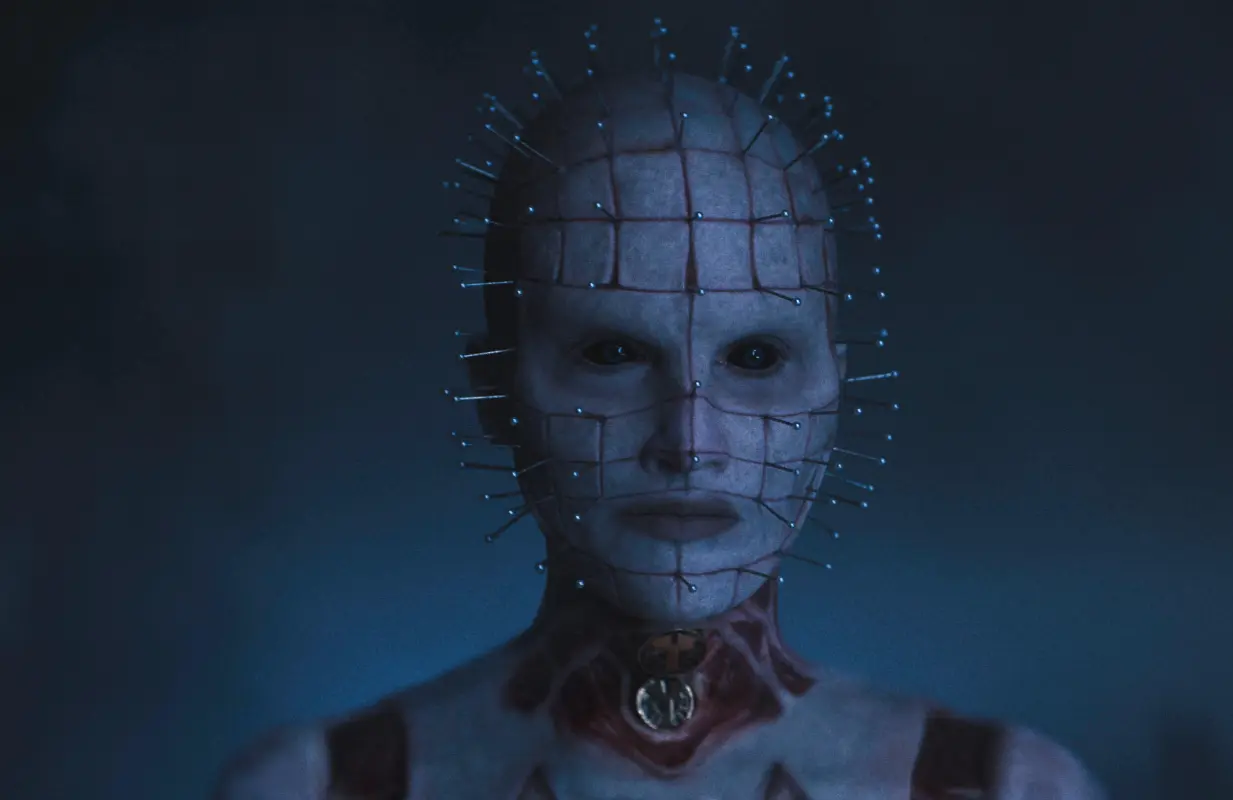Hulu's Hellraiser Reboot Finally Treats the Franchise With Respect
-
 Jamie Clayton as Pinhead. (Photo: Spyglass Media/Hulu)
Jamie Clayton as Pinhead. (Photo: Spyglass Media/Hulu)To read Clive Barker is to experience something otherworldly – to bear witness to the beauty that exists in the monstrous. His 1987 film Hellraiser, adapted from his novella The Hellbound Heart, does precisely this, offering audiences a bold vision of horror. Unfortunately, that vision was diluted by a franchise of derivative works. Now, with director David Bruckner taking the reins, a new film, simply called Hellraiser, is trying to recapture the long-lost magic.
It lands somewhere in the middle. Mostly, the new Hellraiser can’t decide whether to embrace the eroticism of death and pain that makes Barker’s work so thrilling or simply to settle for being a traditional piece of horror filmmaking.
The plot opts for a retread. It centers on Riley (Odessa A’zion), a recovering addict whose strained relationship with her brother Matt (Brandon Flynn) gets even worse when Trevor (Drew Starkey), her shady sort-of-boyfriend, steps into her life. Through him, and his plan to rob a vault, the Lament Configuration — the series’ famed puzzle box that opens a schism to a realm of unfathomable pleasure — ends up in Riley’s hands, and that leads to Matt getting pulled into a hell ruled by demonic beings known as Cenobites.
From there, screenwriters Ben Collins and Luke Piotrowski (as well as David S. Goyer, who shares a story credit) follow a simple structure that will be familiar to anyone who has watched a Hellraiser sequel, or, hell, any horror film. Something bad happens, people experience brutal deaths, rinse and repeat.
That’s disappointing, but the script does at least expand the lore of the Hellraiser universe, particularly regarding the puzzle box and the horrors and promises it holds. Plus, the narrative simplicity gives Bruckner room to play with both his actors and the spaces they inhabit, using special effects to reveal new worlds in even the most innocuous locales. This can lead to dazzling moments, like a late set piece whose deliciously saturated reds and blues are in conversation with Dario Argento’s Suspiria and Inferno. There are also several scenes with beautifully crafted Cenobites around every corner, and it’s devilishly exciting to meet them.
Yet even here, one is reminded of a quote from The Hellbound Heart: “No tears, please. It’s a waste of good suffering.” Apparently unaware of its own strengths, the film similarly wastes some of its beautifully crafted environments by obscuring them with dark or muddy lighting. It makes one long for the distinct shadow play of Barker’s original film, which knew just when to dole out grotesquery and how to make the beauty of bloodshed pop.
Still, even though it’s not as aesthetically or thematically engaging as Barker’s vision, the film does have two performances that transcend these limitations. A’zion is an ideal final girl, communicating much-needed gravitas in a story that frequently forgets the exhaustion that comes with overwhelming loss. It’s the kind of work that leaves you wanting more, similar to the way both Ashley Laurence and Clare Higgins provided Hellraiser and Hellbound: Hellraiser 2 with unique portraits of flawed humanity.
Jamie Clayton, meanwhile, delivers a version of Pinhead that feels indebted to Doug Bradley’s work without being an imitation. In his iconic performance as the Cenobite leader, Bradley dominated every frame he was in. His voice exuded complete control, never suggesting weakness in even the most surprising situations. Clayton follows suit. Her presence makes an impact, even when the film puts her in the shadows, and there’s an ethereal quality to the way she speaks, her intonation always sounding level-headed while giving glimpses of emotion.
Thanks to these touches, Bruckner’s film certainly merits a watch. Where many legacy sequels, like Halloween and Scream, want to both exploit the past and rewrite it for their own foolish endeavors, the new Hellraiser is content to exist as its own product while modestly expanding the lore that already exists. And while this may sound like a backhanded compliment, there really is something comforting in a franchise film that’s flawed but decent enough.
Hellraiser is now streaming on Hulu.
Juan Barquin is a Miami-based writer, programmer, filmmaker, and co-creator of the queer film series Flaming Classics. They aspire to be Bridget Jones.
TOPICS: Hellraiser, Hulu, Clive Barker, David Bruckner, Jamie Clayton, Odessa A’zion